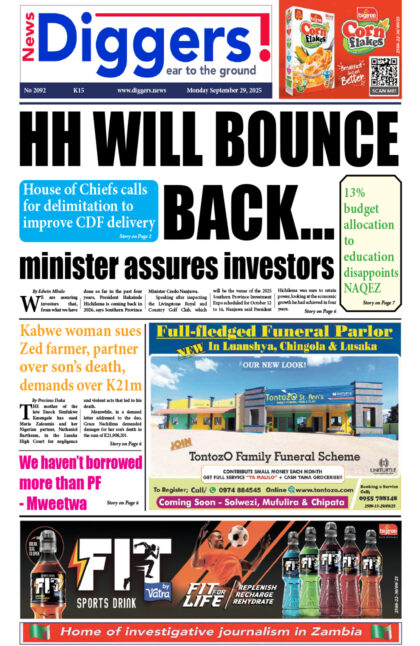Medical practitioner Dr Aaron Mujajati says the Zambian and the United States governments should resolve the current tension without affecting the much-needed donor support to Zambia, particularly to the health sector.
The US government withdrew its Ambassador to Zambia Daniel Foote amid a diplomatic row after he criticized the imprisonment of a Kapiri Mposhi gay couple to 15 years, while equally castigating government officials’ continued theft of public funds, but they are left scot-free.
However, earlier this month, President Edgar Lungu lashed out at the US Envoy, announcing that government had formally complained to the White House about Ambassador Foote, adding that Zambia did not want “such people” in its midst.
The US State Department had since confirmed that Ambassador Foote had since been withdrawn, but added that his replacement would not immediately be deployed.
The diplomatic row between Washington D.C and Lusaka threatens to jeopardize over US $500 million per annum in bilateral donor aid.
In an interview, Dr Mujajati, however, said it was important that the two countries settled the quarrel without affecting the role of donor aid in the health sector in which over one million Zambians were still dependent on life-saving American-aided Anti-Retro-Viral (ARV) treatment.
“It’s an issue that you know for a fact that the entire ARVs and HIV programmes is almost single-handedly funded by the Americans. The relation that the Zambian government shares with the Americans is extremely important to the over one million Zambians who are on ARVs. Almost the whole programme is funded by the Americans. So, you will want to make sure that relationship is managed in such a way that patients do not suffer because we don’t want a situation where this issue is either managed in a way that will begin to see that even the ARVs programme begins to suffer. We don’t want that. Nobody wants that,” Dr Mujajati, the former Zambia Medical Association (ZMA) president, said.
“My hope is that whatever misunderstanding that is there is not something that will escalate to those levels. I hope it doesn’t escalate to those levels. So my concern and my hope is that…it doesn’t escalate, that it will just end where it has ended and that we will get back to our usual working relationship with them for the sake of our patients; the one million people who are depending on the American programme of HIV.”
He said both governments should remember that they were dealing with human lives who required the much-needed support to sustain their lives.
“America is not one of the biggest; it is the biggest when it comes to the HIV programme in Zambia. It is the biggest. Well, I am sure that they (Americans) have something to lose, remember that we are dealing with human rights. That is why I am just praying and hoping that it should not escalate. They should just talk about that than [get] to a situation where people begin to say, ‘no, we are now going to start reviewing the aid and all that…’ I don’t want it to reach that stage. As a (medical) practitioner, I don’t want it. My appeal is that the Zambian and the American governments can resolve their issues without involving ordinary Zambians,” said Dr Mujajati.

























2 responses
Pride does not build a nation…
Dona funding is usually not appreciated by recipients until it is no more. Furthermore the citizenry doesn’t even know where ARVs come from. Had they known their response would have been different. For many people living with HIV and Aids, donor funding borders on life or death
That is why it is important to separate politics from things that shouldn’t be political. It is easier said than done.